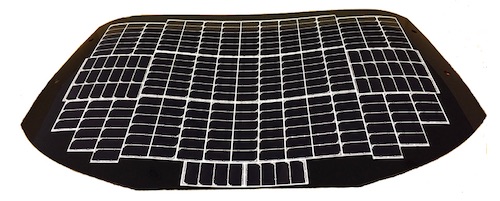NEDO, Sharp Corporation, and Toyota Motor plan to commence public road trials of electrified vehicles equipped with high-efficiency solar batteries later this month.
The trials aim to assess the effectiveness of improvements in cruising range and fuel efficiency of electrified vehicles equipped with high-efficiency solar batteries.
To facilitate the execution of this trial, Sharp modularized its world-class, high-efficiency solar battery cells (conversion efficiency of 34 percent+), previously developed for a NEDO-led project, to create an onboard solar battery panel.
Toyota installed this panel on the roof, hood, rear hatch door, and other parts of its “Prius PHV” and produced a demo car for public road trials.
By enhancing the solar battery panel’s efficiency and expanding its onboard area, Toyota was able to achieve a rated power generation output of around 860 W, which is approximately 4.8-times higher in comparison with the commercial model Prius PHV (equipped with a solar charging system).

In addition to substantially boosting its power generation output, the demo car employs a system that charges the driving battery while the vehicle is parked and also while it’s being driven, a development that is expected to lead to considerable improvements in electric-powered cruising range and fuel efficiency.
Toyota plans to conduct the trials under various driving conditions in Toyota City, Aichi Prefecture, Tokyo, and other areas. Various data, including the power generation output of the solar battery panel and the amount the drive battery is charged, will be obtained and verified, and then used in the development of an onboard solar recharging system.
Toyota plans to share a selection of trial data results with NEDO and Sharp.
The PV-powered Vehicle Strategy Committee (PV stands for photovoltaic), sponsored by NEDO and other entities will evaluate the benefits based on improvements in CO2 emissions reductions and convenience, such as the number of times a vehicle requires recharging.
The goal is to contribute to the creation of a new solar battery panel market, including the transport sector, and find solutions for energy and environmental issues.

The road to the solar battery
In April 2016, NEDO, a national research and development organization, set up the PV-powered Vehicle Strategy Committee, which is comprised of members from industry and academia.
With the goal of finding solutions to energy and environmental issues in the transport sector, the committee’s research focuses on solar power systems.
Sharp and Toyota are also active committee participants. The achievements the committee has made thus far include estimates on the potential to achieve an output of 1 kW in vehicles, despite the limited space for installing power systems, by using a solar battery module with a conversion efficiency of 30 percent-plus, zero annual recharging depending on usage patterns, and estimated benefits from a reduction in CO2 emissions.
Profile of demo car
The demo car is equipped with a solar battery panel that utilizes several solar battery cells with a conversion efficiency of 34 percent-plus.
The shape of the module, environmental durability, surface materials, and other factors are based on specifications for driving trials implemented by Toyota. The solar battery cell is a thin film about 0.03 mm in thickness.
This makes it possible to efficiently install the film to fit the curves of parts with limited space, including the vehicle roof, hood, and rear hatch door. The rated power generation output of the demo car is approximately 860 W.
Previously, the Prius PHV charged the driving battery only while the vehicle was parked. However, with improvements in power generation output, the demo car employs a system that charges while the vehicle is being driven. This is expected to boost the BEV-mode cruising range and fuel efficiency significantly.
Trial timeline
Toyota plans to share a selection of trial data results with NEDO and Sharp. The PV-powered Vehicle Strategy Committee and other entities will evaluate the benefits from improvement in the reduction of CO2 emissions and the improvement in convenience, including the number of times a vehicle requires charging.
The goal is to further contribute to the creation of a new solar battery panel market, including the transport sector, and find solutions for energy and environmental issues.
- High-efficiency solar battery cell: Development of the above cell was carried out by a NEDO-led project. Applications were envisaged for the power generation business to achieve a cost of YEN7/kWh. The project aims to focus on the high conversion efficiency rate and verification of its potential for use in vehicles.
- Conversion efficiency of 34 percent+: Calculated based on cell output (as measured by Sharp) under AM1.5 G standard solar battery test conditions as stipulated by international standards.
- NEDO project: Project Development of high performance and reliable PV modules to reduce levelized cost of energy; research and development of innovative new structure solar cells; research and development of ultra-high efficiency and low-cost III-V compound semiconductor solar cell modules Period FY 2016 to 2020
- Approximately 860 W: Total module output based on calculation of cell output (as measured by Sharp).
- PV-powered Vehicle Strategy Committee: Established by NEDO in April 2016 to conduct research and investigate automotive photovoltaic systems with the goal of further contributing to finding solutions for energy and environmental issues and to create new markets.
- Estimates: Examined the benefits of CO2 emissions reduction, user convenience (number of times the vehicle requires charging), and benefits of CO2 emissions reduction to society at large when the use of PV-powered vehicles is widespread. The results were published in an interim report released in January 2018.

